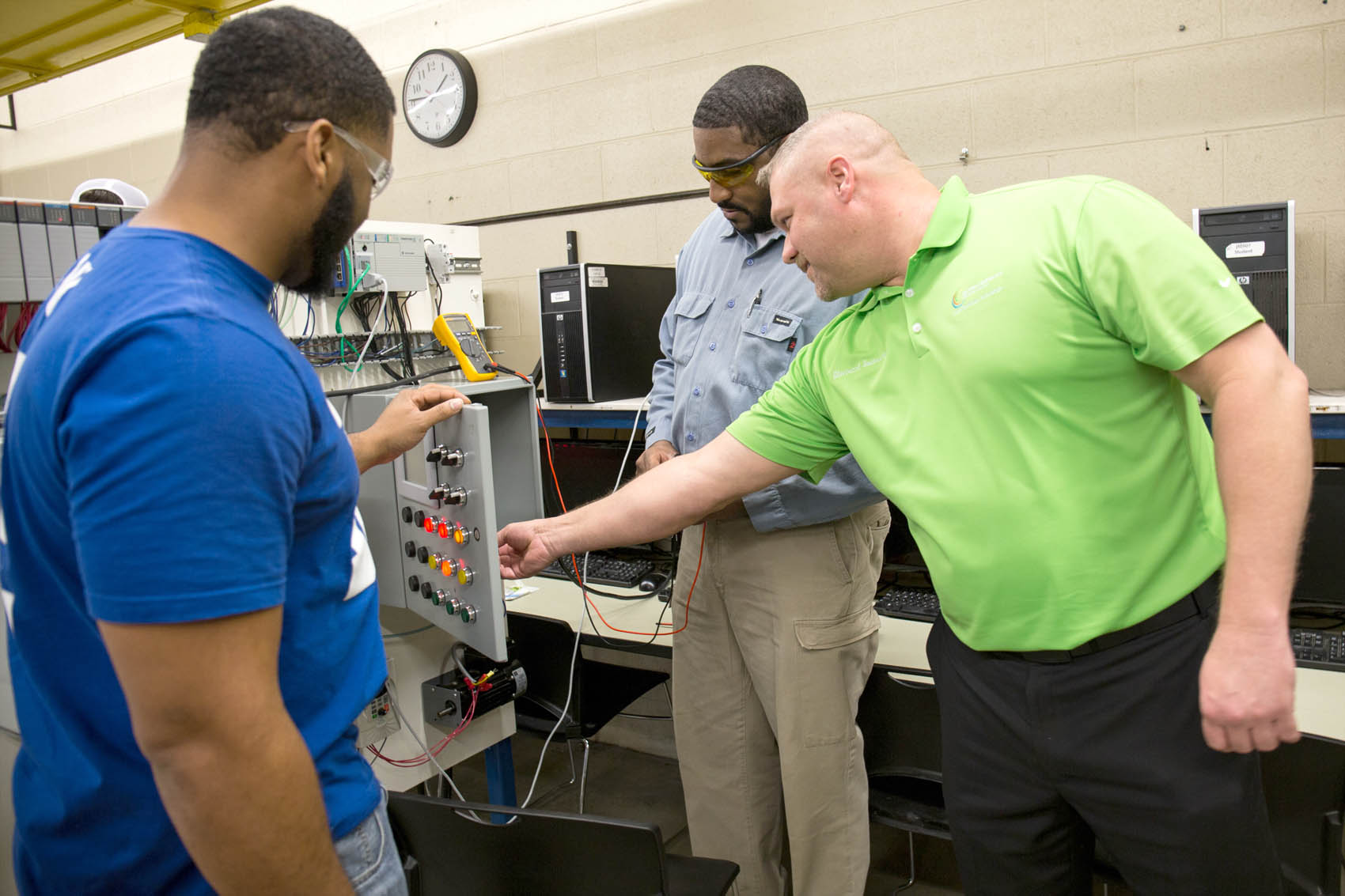College News
Womack trains future industrial programmers at CCCC
Notice: This article is older than 12 months. Names, contact information, programs, titles, etc. might have changed. If you have any problems please call the main college number, 1-800-682-8353, and we will be happy to direct you accordingly.

click image to enlarge ⊗
Matt Monarca, The Sanford Herald. Central Carolina Community College Industrial Systems Instructor ... (more)
02.09.2017 • College & Community • College General • Curriculum Programs
By Zachary Horner, The Sanford Herald
SANFORD - After getting out of the military, Wesley Womack went through the Industrial Systems Technology program at Central Carolina Community College. He spent eight years in the field, working for companies like GKN Driveline and Hanes Brands, before returning to the classroom, this time to teach.
"I'd always thought it would be pretty cool to help people out," he said. "I like seeing students have that light bulb kind of moment where they went from not understanding to where they are understanding."
Womack has taught in the IST program for around 7 1/2 years now. He talked to The Sanford Herald about what IST is, the types of projects his students work on and why learning about IST is a "life-impacting" experience.
What is your daily routine?
I come in about 7:30 (a.m.) and do preparations for the classes for the day, whatever lessons have already been planned. Then just conduct class. If it's a lecture, you're going to go over a lecture and maybe include a PowerPoint or a demonstration, or if it's a lab then explain what's going to happen for the lab, if it's hands-on or programming. Then I help guide them through that.
What kind of projects do your students work on?
It's a variety of things. It really depends on which class you're in. In PLC (programmable logic controller) programming, they're programming computers, just industrial computers. Other classes might be involved with disassembly or reassembly of hydraulic components, it might be wiring a circuit, for motors and controls, disassembling motors and reassembling motors.
For people who may not know, what exactly is Industrial Systems Technology?
Probably the best way to explain it is (that) it's what is required to make all these manufacturing facilities run. All of the machines, what keeps them in operations, and all the support systems, pneumatic systems, HVAC systems, electrical systems. Just what keeps all these plants (going).
What's the most complex project students work on?
Some of the larger programming assignments. (One project is) a scaled-down version of a five-story elevator. That seems somewhat simple, probably, but from a programming perspective, it's pretty complicated. It's probably similar to things you would use on your computer. It's pretty intuitive and it seems easy to use, but if you were the developer that's making that software, it's going to be pretty complicated. And even things as simple as a stoplight. Most people don't realize how those actually operate. You sit at one every day, and it's like magic how it operates. Well, they operate off of PLCs.
Why is it necessary to have classes like these?
The best way to justify all of this is helping people's futures. We had a former student come and visit just last Friday, and he was telling them, "This is a life-changing experience." He had gotten out of the military and had tried operating a business and was unsuccessful after a period of time, so he decided to come back to school. Now he's doing very well. Most of the students start out at $20-plus an hour. They actually start out making more than I do. There's not a shortage of jobs for it either. I got an email last week from a guy who had hired two of our students and wants to hire two more. Just word of mouth gets around -- if you have students doing quality work in the workplace, they come back and want to keep recruiting from here.
What do you enjoy most about this job?
There's lots of good things about it. As far as the atmosphere of just helping people learn, I like that. Everybody seems very friendly and very enabling, contradictory to some of the other places I've been. Everybody around here is very positive.
It seems like electricity is magic to people. When they go to understanding how it works from just thinking it's magic, it's a light bulb moment.
Categories
- Admin, Faculty & Staff Category
- Arts & Entertainment Category
- Clubs Category
- College & Community Category
- College General Category
- Continuing Education Category
- Curriculum Programs Category
- Distance Education Programs Category
- Facilities/Buildings Category
- Finances Category
- Foundation Category
- Graduations Category
- Lee Early College Category
- NCCCS Category
- SGA Category
- Special Events Category
- Sports Category
- Students/Graduates Category
- Uncategorized Category
Archives

